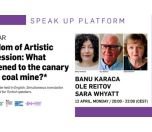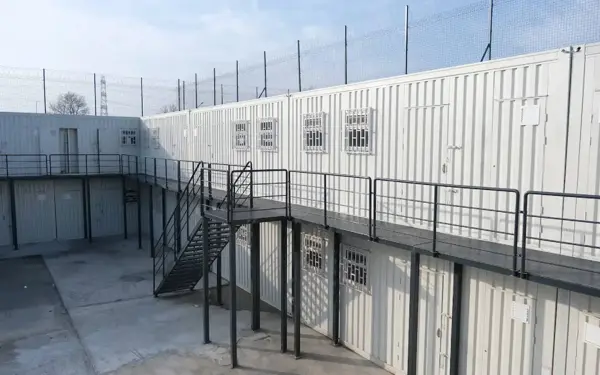Click to read the article in Turkish
Although art has been one of the most fundamental areas of freedom of expression, it has never been just a form of expression but has always extended beyond it. It has nurtured cultural diversity and reflected social problems. Sometimes it even triggered social changes.
Perhaps it is exactly the motivation of those who restrict artistic expression because they know that art has the power to make such changes. Freemuse shares a similar view.
The organization, which is an independent international non-governmental organization that advocates freedom of artistic expression and cultural diversity, takes a snapshot of the freedom of artistic expression in the world with the reports they prepare. One of these reports was published recently.
We have interviewed its executive director, Dr. Srirak Plipat, about the striking findings in the report.
On February 25, you released a report about the state of artistic freedom in the world. Could you tell us, how was 2020 in terms of artistic freedom of expression in the world?
The year 2020 has been a challenging year for artists and cultural workers. Not only that their livelihood has been taken away from them due to cancellations of their work, but the freedom to express themselves, the right to create has been limited to a level that we haven't seen before.
This happened in the context where nationalism and populism continue to grow in many parts of the world. Many of the governments, political parties in power continue to swing to the right in terms of their political stance.
This has resulted in an increasingly high number of restrictions on artistic freedom. We saw last year, for example, the number of artists being killed increased by almost double from nine to 17. The imprisonment of artists has increased by 15%, from 71 to 82 artists. And the prosecution has been increased by over fourfold, from 23 to 109.
How has the Covid-19 pandemic affected artistic freedom of expression in the world?
During 2020, as for cases related to the pandemic directly, four artists were imprisoned in Algeria, Morocco, and Tunisia, while 48 artists were prosecuted in nine countries and 13 artists were detained in 10 countries. When looking at the grounds on which artists are being silenced in relation to the Covid-19 pandemic, we found that very often, they're being charged on the ground of spreading disinformation on the pandemic.
Artists have also been silenced for joining protests during the pandemic, while others for creating artwork critical of governments during this particular time.
The report shows that 26 percent of the restrictions of artistic freedom of expression documented in 2020 were in Europe. This rate is higher compared to the rest of the world. Why do you think there were more restrictions in a continent where freedom of expression, in general, is better than the rest of the world?
The 26 percent restriction of freedom of artistic expression is indeed very worrying. It shows us how the trend of political radicalization and rise of nationalism and authoritarianism have an impact on European Union and Europe in general as well. While some cases of censorship were sporadically documented across Europe, most legal prosecution, detention and imprisonment cases were documented in countries where Freemuse regularly registers a higher number of violations of artistic freedom, such as Russia and Turkey.
In Russia, artistic freedom was challenged under the law on public gatherings, where they faced arrests and were ordered to pay fines for staging artistic performances in public spaces without authorities' approval or because of their LGBTI-themed artworks. In Turkey, the insults of the president and alleged artists' association with banned pro-Kurdish organizations were the main reason for legal prosecution.
In Belarus, dozens of artists were arrested and prosecuted because of participation in protests following the August elections. Freemuse also documented a higher number of cases in France and the UK, as well as Poland, Belgium and Serbia. The rationales used for suppressing artistic voices in these countries varied from censoring art critical of governments' response to Covid-19 pandemic and other state policies, preventing artists from participating in Black Lives Matter protests, prosecuting them for LGBTI expressions, etc.
What kind of rights violations against artists did you find in Turkey in 2020?
In Turkey, government authorities continued to be a major obstacle for exercising artistic freedoms, being responsible for 90 percent of all cases of violations Freemuse documented in 2020.
Kurdish artists and cultural centers were particularly vulnerable to targeting by state authorities, with singer and filmmaker Hozan Canê sentenced to six years in prison for "membership of a terrorist organization" and "spreading propaganda for an illegal organization". She was released from prison on 30 September 2020, but the trial against her continues. Kurdish folk musician Ferhat Tunç has been under constant scrutiny by the authorities since 2012, when he was first convicted under anti-terror legislation. The artist faces up to 20 years in prison for "openly inciting people to hatred and enmity".
A vague framework and wording of anti-terror law and criminalized insults against the president were behind more than half of the documented violations. Members of the Grup Yorum were arrested on multiple occasions, their concerts were banned and the Idil Cultural Center where they rehearse was raided several times. Two of Grup Yorum members - Helin Bölek and İbrahim Gökçek – died as a result of "death fasts" in April and May 2020 respectively.
Artists in Turkey continuously face problems for political comments posted online. On 29 July, the Turkish parliament passed a new law which allows for stricter control of social media, thereby requiring social media companies to appoint local representatives tasked with responding to complaints about content published on their platforms. This law was adopted as the authorities have been monitoring dissent on social media and initiating legal cases for content deemed 'inappropriate', politically 'controversial' and 'insulting of the president'.
What changes have you observed in Turkey this year compared to the previous years? How would you evaluate the state of artistic freedom of expression in Turkey and what does the current situation in Turkey tell us about the future?
Turkish authorities over the years have been determined to systematically suppress any political dissent, including opposition voices expressed through art and by artists. This means that most of the violations of artistic freedom Freemuse documents in Turkey perfectly mirror problems other groups – such as academics, journalists, activists – face in Turkey. The situation has been constantly deteriorating since the attempted coup d'etat in 2016. Authorities continuously misuse the 1991 Anti-Terror Law (no. 3713-TMK) and Article 299 of the Turkish Penal Code (Insulting the President of the Republic) for legal prosecution of opposition-aligned artists.
The introduction of the new law on social media in 2020 shows how in an already tensed atmosphere for the exercise of the freedom of expression, authorities come up with additional tools to further curb free speech, including in digital space. Kurdish artists remain targets of President Erdoğan's regime, being unable to create and promote their art in their native language without being characterized as supporters of terrorist organizations.
In order to improve the state of artistic freedom, Turkey needs to uphold its obligations under international law and create a space for the unhindered exercise of the freedom of expression and atmosphere where Turkish citizens would be able to express themselves freely without the fear of consequences.
It needs to repeal the law on insults against the president because this legislation has no place in a democracy where heads of state should be subject to scrutiny and challenge without fear of repercussions.
Among the documented prison sentences given to artists in the world, 74 of them were related to criticism of governments' policies and practices. Why do states approach artists as if they are enemies?
Artists and artworks everywhere can have a significant impact on societies with their messages. Governments' actions of targeting artists critical of the authorities aim to silence political dissidents by persecuting artists for staging, organizing, or participating in anti-government protests.
Sanctions for alleged insults to the authorities have also been used as a way of silencing the dissident voices of artists.
What are your expectations from states for making artists express themselves better in 2021?
Governments worldwide need to harmonize national legislation and policies and practices related to freedom of expression with the international human rights standards. They need to accept that freedom of expression applies not only to neutral and affirmative information but also to those opinions that are critical, shocking, sometimes disturbing and offending.
Further, they should stop misusing legitimate grounds for the restriction of freedom of expression for illegitimately suppressing artists' voices. The prospects for the improvement of the state of artistic freedom however do not seem promising, having in mind that the world has been facing the Covid-19 crisis which goes way beyond being only the health crisis. Freemuse has been concerned about so many negative developments in countries across the globe, where governments weaponized the pandemic to become more authoritarian and suppress any criticism and dissenting voices. (HA/VK)











